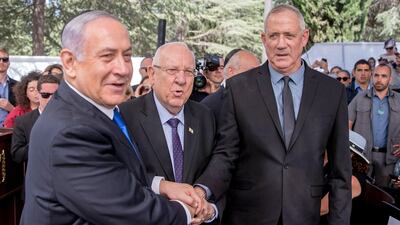Arab Israeli politicians on Sunday offered their support to Benny Gantz in his bid to form the next government after results from elections earlier this month showed no clear parth to the premiership for either the former former army chief or Benjamin Netanyahu, the incumbent.
The Arab Joint List decision was announced on Sunday evening after talks earlier in the day ended inconclusively. "Today history is made: We'll do what is needed to bring down Netanyahu," Arab Knesset member Ahmed Tibi said on Twitter.
Arab Israeli parties have traditionally refused to endorse any prime ministerial candidate, apart from in 1992 when they backed Yitzhak Rabin after he pledged to pursue peace with the Palestinians.
The 13 seats won by the Arab Joint List will be crucial to Mr Gantz after his Blue and White party won the election with 33 seats out of the 120 in Israel’s parliament but fell short of the 61 needed for a majority.
Mr Netanyahu's Likud party won 31.
The Arab Joint List, a coalition of four Arab-majority parties led by Ayman Odeh, had said it wanted promises on key issues from Mr Gantz before it offered support, such as the revocation of the controversial Nation State law that classifies Israel as the homeland of the Jewish people. It was not immediately clear if Mr Gantz had agreed.
President Reuven Rivlin on Sunday launched consultations with political parties about his choice for the next prime minister and the formation of the next government.
The deciding factor looks to be Avigdor Lieberman and the eight seats his Yisrael Beitenu party captured. Mr Lieberman is demanding a broad unity government with the two major parties that is secular and excludes the ultra-Orthodox Jewish parties. That appears to be the emerging compromise between Blue and White and Likud, although both are insisting upon leading it.
Complicating matters is Blue and White's refusal to sit with Mr Netanyahu because he faces a likely indictment on corruption charges.
Once President Rivlin decides on a candidate to form the next government, they will have up to six weeks to form a coalition. If that fails, Mr Rivlin could give another candidate 28 days to form a coalition. And if that does not materialise, new elections would be triggered yet again.
Mr Rivlin said he will do everything possible to avoid such a scenario and no one appears interested in a third Israeli election within a year.
Last week's vote happened because Mr Netanyahu was unable to form a coalition after April's election without the support of Mr Lieberman, an unpredictable ally-turned-rival who has upended Israeli politics in recent months. The nationalist, yet secular, former defence minister is still being coy about whom he will recommend as the next prime minister.
Overhanging the whole process is Mr Netanyahu's pre-indictment hearing scheduled in two weeks, after which he could face charges of bribery, breach of trust and fraud in three separate corruption cases. Mr Netanyahu had hoped to secure a narrow majority of hard-line and religious parties that support granting him immunity from prosecution. With immunity now off the table, Mr Netanyahu is desperate to remain in office despite the long odds.
Israeli law does not require a sitting premier to resign if indicted. But if he is charged, as is widely expected, he would come under heavy pressure to resign.

